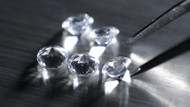Do Lab Grown Diamonds Jewelries Hold Their Value? Factors to Be Considered
Aug 26th 2023
Diamonds have always held an allure when selecting jewelry pieces, with diamonds representing love and beauty while acting as an invaluable investment. Recently, lab-grown diamonds have emerged as an affordable alternative to natural ones; prompting many to question as “do lab grown diamonds jewelries hold their value?”. In this article, we will exlore into this topic here by specifically exploring lab-grown diamond jewelry's value over time.
What are Lab Grown Diamonds?
Lab-grown or synthetic diamonds, commonly referred to as man-made or synthetic diamonds, are produced in controlled environments that replicate natural conditions for diamond formation. Their chemical composition, physical characteristics and aesthetic appeal mirror that found in natural diamonds; the primary difference is in their source: one mined from Earth's crust while the other can be grown in a laboratory.
The Appeal of Lab Grown Diamond Jewelries
Lab-grown diamond jewelries have quickly gained in popularity for multiple reasons. First and foremost, lab-grown stones tend to be more affordable than their natural counterparts and thus more accessible for consumers with modest budgets. Furthermore, due to ethical and environmental considerations associated with mining for diamonds many consumers now opt for lab-grown stones which have reduced impact on the environment. But the lingering question remains: Do lab grown diamond jewelries hold their value?
Buy Now: Diamond Bracelets
Do Lab Grown Diamonds Jewelries Hold Their Value?
Many prospective buyers and investors often ask themselves this question about lab-grown diamond jewelries, with no clear-cut answer available. While lab-grown diamond jewelry does have some value, other factors must also be taken into consideration before making their decision.
Factors Influencing Resale Value
- Market Acceptance: As lab-grown diamonds have gained recognition and acceptance in the market, their resale value has also improved. However, they may not yet hold the same resale value as natural diamonds due to historical perceptions.
- Technological Advancements: Ongoing advancements in diamond-growing technology could impact the value of lab-grown diamonds over time. Older generations of lab-grown diamonds might not command the same value as newer, improved ones.
- Consumer Preferences: Resale value is also influenced by consumer preferences. If the demand for lab-grown diamond jewelries remains strong, their value is likely to hold steady.
- Comparing Resale Value: Lab Grown vs. Natural Diamonds
Lab grown diamondsmay not boast the same resale value of natural diamonds at this point in time, but their lower initial costs could partially compensate for any differences in resale value. Furthermore, as lab-grown diamonds become more mainstream and gain wider acceptance their resale value could increase.
Do Lab Diamond Jewelry Have a Resale Value?
"Do lab Diamond jewelry have a resale value?" is another frequently asked question, and the answer is in the affirmative. Like other forms of jewelry, lab-grown diamond pieces may be resold; however, there can be no guarantees as to its exact resale value - therefore setting realistic expectations with regards to potential returns from sales is key for optimal returns from any potential sales transactions.
Get here: Eternity Rings
Conclusion
In conclusion, the question "Do lab-grown diamonds jewelries hold their value?" doesn't have a simple yes or no answer. Lab-grown diamond jewelries do have value, and their resale value is influenced by market trends, technological advancements, and consumer preferences. Though lab-grown diamond jewelry might not offer the same resale value of natural diamonds, they offer accessibility, ethical considerations, and potential to increase over time. If investing in lab-grown diamonds as jewelry purchases is your plan, it is crucial that you research, compare and make an informed decision based on your priorities and expectations.

